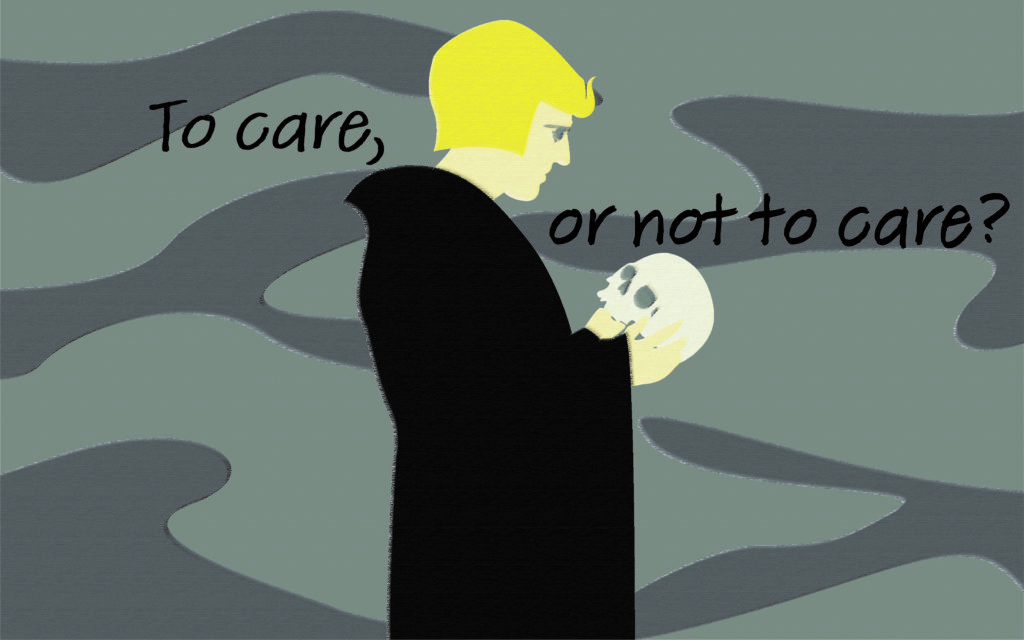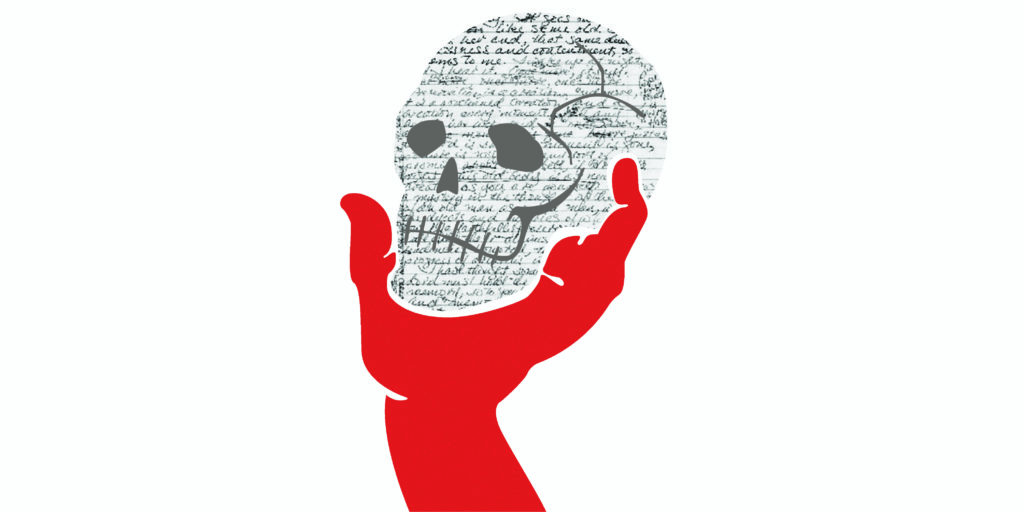I turned 39 not long after my first daughter was born. When she was about five months old, I saw the big four-oh on the horizon, and started to think about what I was going to leave behind when I was gone, at least from a literary perspective. So I looked at the bookshelf of works I’d published: four cartoon collections, two critical studies, a series of scholarly articles, some translations, and a handful of stories and essays. There was enough there, I figured, to get her through a few weeks of reading. But then what? What would she read next?
The more I thought about this question, the more I felt compelled to write new material, which led me to reflect on the links between storytelling and death. I remembered reading Joan Didion as a graduate student, especially her classic opener, “We tell ourselves stories in order to live.” It sounded right when I was younger, but from where I sat today, I wasn’t so sure it was the only reason. Perhaps we told ourselves stories in order to live. But it seemed to me that we told others stories in order to die.
In One Thousand and One Nights – in which Scheherazade, the vizier’s daughter, faces death daily at the hands of a jealous king — she ends each night with a story she finishes the next day. She uses storytelling to stay alive. But the stories do end. And the book ends too. Sure, the king spares her life and makes her his queen, but that’s just fiction, the illusion of control that stories try to give us. For 1,001 nights — for nearly three years — Scheherazade lived her life with the specter of death hanging over every word that came out of her mouth. Every word was actually a step on the way toward dying.
Ingmar Bergman knew this, which was why, in The Seventh Seal, he had death play chess rather than listen to stories. In a story about a crusader who, returning from killing others in the name of God, finds that the society he’d left behind is now ravaged by the Black Plague, the knight challenges death to a chess match. The knight knows he can’t beat death. When the game is over, he dies. But he’ll at least have gained the thrill of the game.
Plato knew this too. Even as a young man, he put Socrates, a dying dialogist, at the center of his stories. He didn’t do it because he thought it would bring him immortality. That was the perspective of his character, Socrates, who, as a martyr of authenticity, killed himself in order to stay true to what he believed. Plato saw that all that was really left of Socrates were the stories about him. So he became his greatest storyteller. He even absented himself from his own telling of Socrates’s death. And, to this day, people concern themselves more with Socrates’s death than they do with Plato’s death. Compared with his own account of the death of Socrates, Plato’s death barely merits a footnote.
As I reflected on these questions, I kept wondering whether they were symptoms of a so-called midlife crisis. Elliott Jaques, who coined the term, had made such an impression on the Psychoanalytic Society when presenting his paper on “The Mid-Life Crisis,” that everyone in the room was left silent. In There Are No Grown-ups: A Midlife Coming-of-Age Story, Pamela Druckerman reports that Melanie Klein, Jaques’s mentor, told him the next day, “If there’s one thing the Psychoanalytic Society cannot cope with, it’s the theme of death.” She should know. Her own theories on the essential role of the death drive in the psyche were critiqued and rejected by the same Psychoanalytic Society. Yet the same could probably be said of most societies. In this, as in many other things, psychoanalysts are just as human as — and certainly no wiser than — the rest of us.
And so I began to wonder whether I was actually going through something that might better be called a middeath crisis. The idea of a crisis in the middle of life assumes that we know how long we’re going to live. But as Jerry Belson put it long ago, when we ASSUME, we make an ASS of U and ME. I don’t know that I’m at the midpoint of my life. I can only hope that I’ll live for the same amount of years as I’ve lived so far.
A midlife crisis is supposed to reflect our realization that we are going to die. A middeath crisis is the realization that we are actually dying. It might take as long to die as it’s taken to realize that we’re going to die – but this is the moment we face the fact that everything we know will reach a point when, as far as our living minds can understand it, resembles what we conceptualize as an end.
I remember I was in my sister-in-law’s apartment in Brooklyn a number of years ago when her husband, Richard, got a text message saying his grandfather had died. His grandfather was 103 and had lived a good, long life. His wife had died just months earlier at the age of 101. And I can’t explain why, but at that moment, looking into Richard’s sad eyes, I started to cry too, feeling, for the first time, like I could really connect — in the deepest possible way — to the phrase meet your maker. His grandfather, I felt, had lived more than most of us will ever dream of living. And now it was time for him to leave the rest of us and face whatever it was that put him on this planet.
One of the most powerful insights I gained from studying psychoanalytical writings, especially those of Melanie Klein, has to do with imagined fears. Her idea is that our imagined fear is so strong, that sometimes we actually prefer to experience real pain rather than to live with the anxiety of our fear being realized. We sometimes create situations in reality, she suggests, in reaction to fear over what we imagine might happen. This plays itself out in how we tell stories. Fearful of death, we spend our lives preparing for it by telling stories.
People often think of Hamlet’s most famous quandary as a question of life or death — to be, that is, is to live, or not to be, that is, to die. But maybe his distinction was subtler. Maybe he was thinking about the gap, however small, that exists between living and being. Because being is not something that really has a beginning, a middle, and an end – the way we think of life. It has only the present moment. So what if, to slightly rephrase Hamlet, the actual question is, “To be – or to live?” Maybe his problem wasn’t whether to live or die. It was the imagined fear of what our consciousness, or spirit, experiences when it’s not living, when it’s just being. “Not to be” is to live as much as it is to die. Being, as a state of suspension, is neither weariness nor unknown dreams, it’s just the way we are when we worry about nothing: neither life nor death. It’s existing without caring about the fact that we exist. So maybe another way of putting the question might be, “To care — or not to care?”

I was sharing some of these thoughts with my friend Amnon, a painter who lives in Jerusalem, and he asked, “What is death? It’s just a drive for knowledge.” I asked him what he meant and he suggested that death, as the ultimate experience or the final frontier, was the most mysterious thing of which we can conceive without having knowledge of how it actually feels. “Think of all the research that’s done about death,” he said. “Think of all the things we ‘know’ about death without actually knowing anything about the feeling of dying. Think about suicide. It’s all in order to know.” I smiled. “You make me think of Genesis,” I said. “Why?” he said, smiling. “When did the first people lose their sense of immortality?” I asked. “When?” he said, smiling again. “When they ate from the tree of knowledge.” He nodded. “Sure,” he finally said. “Adam and Eve wanted to know death too. Even at the price of life.” He was obviously right, Adam and Eve were sentenced to death for wanting to know. But someone told us their story, so we know about them even after their deaths, just as we might hope that our loved ones will remember us after we’ve passed into the next world.
Stories are given to us, pass through us, and moves on to others. It’s sometimes painful to think that our parents, who brought us into this world, will die and leave us with nothing but stories. But it’s even more painful to know that we, who might have birthed or raised our own children, will die as they continue to live. One of the things that makes me most sad and angry about life is that I won’t get to see my daughter as an old woman. I won’t get to see the wrinkles that will accumulate on her face. I won’t see the knowing smile that she’ll develop once she’s gone through some of the things that she’ll only go through after I’m gone. And we won’t be able, like two old fogies who know the folly of the world, to laugh at everything around us. This, for me, is the true tragedy of living. And yet, for better or for worse, this is part and parcel of the forces that both brought her to us, and that we have now endowed to her: the forces of life.
This might all seem like an expression of despair. But it’s a testament to hope. It reflects faith in a life beyond ourselves that preserves our traces by telling stories. It makes us part of a memory that continues outside of the limits of our mortal lives. Not because stories make us immortal, but because they bond us more strongly to our mortality. They remind us, at all times, that we are going to die. •




